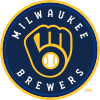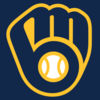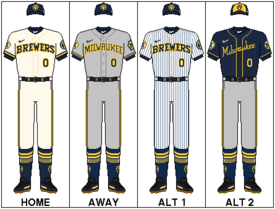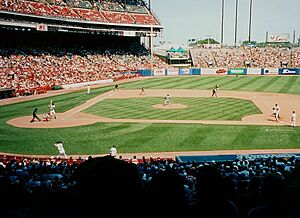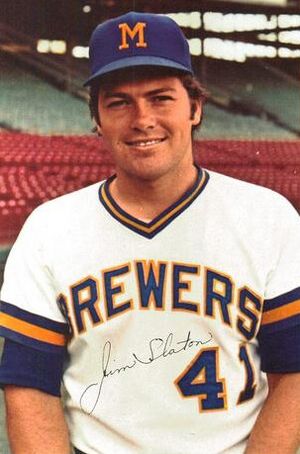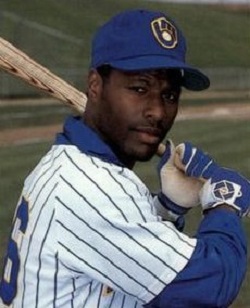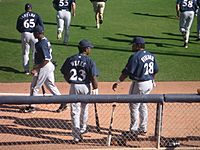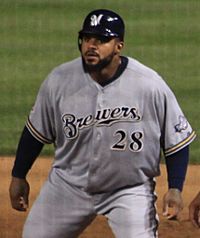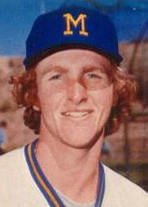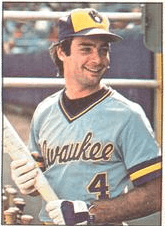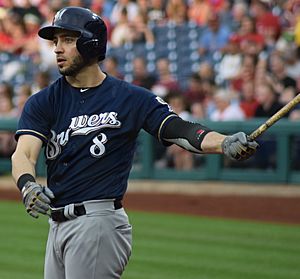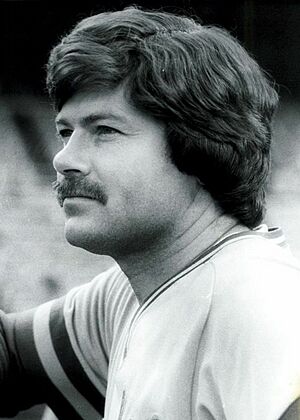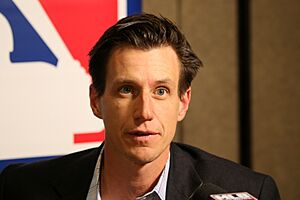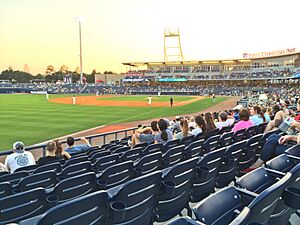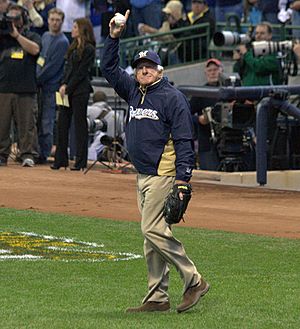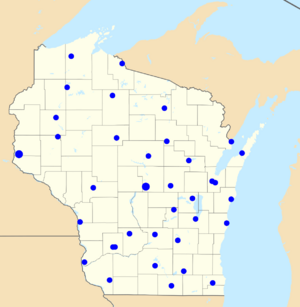Milwaukee Brewers facts for kids
Quick facts for kids Milwaukee Brewers |
|||||
|---|---|---|---|---|---|
|
|||||
|
|||||
| Major league affiliations | |||||
|
|||||
| Current uniform | |||||
| Retired numbers | |||||
| Colors | |||||
|
|||||
| Name | |||||
|
|||||
| Other nicknames | |||||
|
|||||
| Ballpark | |||||
|
|||||
| Major league titles | |||||
| World Series titles (0) | None | ||||
| NL Pennants (0) | None | ||||
| AL Pennants (1) | 1982 | ||||
| NL Central Division titles (5) |
|
||||
| AL East Division titles (1) |
|
||||
| Wild card berths (3) |
|
||||
| Front office | |||||
| Principal owner(s) | Mark Attanasio | ||||
| President | Rick Schlesinger (President of Business Operations) | ||||
| President of baseball operations | Matt Arnold | ||||
| General manager | Matt Arnold | ||||
| Manager | Pat Murphy | ||||
The Milwaukee Brewers are a professional baseball team from Milwaukee, USA. They play in Major League Baseball (MLB). The Brewers are part of the National League (NL) Central Division.
The team is called the Brewers because Milwaukee is famous for its brewing industry. Many other baseball teams in Milwaukee have also used this name. Since 2001, the Brewers have played their home games at American Family Field. Before 2021, it was called Miller Park. The stadium can hold 41,900 people.
The team started as the Seattle Pilots in Seattle, Washington, in 1969. They were an expansion team in the American League (AL). The Pilots played their home games at Sick's Stadium. After just one season, the team moved to Milwaukee. They became the Brewers and played at Milwaukee County Stadium. In 1972, they joined the American League East. In 1998, the Brewers moved to the National League. They are the only team to play in four different divisions since MLB started using divisions in 1969. They are also one of only two current MLB teams to switch leagues. The other team is the Houston Astros.
Rollie Fingers won the first Cy Young Award and Major League Baseball Most Valuable Player Award for the Brewers in 1981. That year, the team reached the postseason for the first time. They finished first in the second half of the season, which was shortened by a strike. In 1982, the Brewers won their division and then the 1982 American League Championship Series (ALCS). They beat the California Angels. The Brewers then played against the St. Louis Cardinals in the 1982 World Series. They lost 4–3 in their only World Series appearance.
The Brewers are one of five current MLB teams that have never won the World Series. They are also the oldest MLB team never to win the World Series, along with the San Diego Padres. With 55 seasons, they have the second-longest championship drought in MLB. Only the Cleveland Guardians have a longer one. After 1982, the Brewers did not make the playoffs for 26 years. They returned in 2008 and 2011. In 2011, they made their first trip to the NLCS. Since 2018, they have been a regular playoff team. They won one playoff series in 2018, sweeping the Colorado Rockies 3–0 in the NLDS.
Overall, the Brewers have won one AL pennant and seven division titles. They have also qualified for the postseason as a wild card three times. From 1969 through 2024, the Brewers' regular-season record is 4,308 wins and 4,530 losses. Since moving to Milwaukee in 1970, their record is 4,244 wins and 4,432 losses through the end of 2024.
Contents
Team History and Milestones
The team started in 1969 as the Seattle Pilots in Seattle, Washington. They played one season in the American League West Division. Then, Bud Selig bought the team and moved it to Milwaukee. They stayed in the West Division for two more years.
Moving Between Leagues and Divisions
Before the 1972 season, the Brewers moved to the American League East. This made room for the Texas Rangers, who had moved from Washington, D.C. In 1994, due to new division rules, the Brewers moved to the American League Central. The Brewers were part of the American League from 1969 until 1997. After that, they moved to the National League Central Division.
Milwaukee had a National League team before, the Milwaukee Braves (1953–1965). It also had an American League team briefly in 1901. This team was the original Milwaukee Brewers. They later moved to St. Louis and became the Browns. Between 1902 and 1952, Milwaukee was home to the Milwaukee Brewers of the American Association (AAA). It also had the Milwaukee Bears of the Negro National League. Both of these teams played at Borchert Field.
Key Playoff Moments
In 1981, Milwaukee won the American League East Division in the second half of the season. This season was shorter due to a strike. Rollie Fingers became the first Brewer to win the MVP Award. He was also the first relief pitcher in American League history to do so. In the playoffs, they lost the Division Series to the New York Yankees.
In 1982, Robin Yount led Milwaukee to win the American League East Division. They also won the American League Pennant. This was their first and only American League pennant. They made their first World Series appearance. In the Series, they lost to the St. Louis Cardinals in seven games. This was the team's last playoff appearance for over two decades.
In 2008, the Brewers made it to the postseason for the first time in 26 years. They won the National League wild card. They were eliminated in the National League Division Series by the Philadelphia Phillies. The Phillies went on to win the World Series that year.
On September 23, 2011, the Milwaukee Brewers won their first division title in 29 years. They won the National League Division Series in five games. They beat the Arizona Diamondbacks. However, they lost the National League Championship Series to the St. Louis Cardinals. The Cardinals later won the World Series.
In 2018, the Brewers made the post-season again. They beat the St. Louis Cardinals 2–1 on September 26, 2018. On September 29, they were tied with the Cubs for first place. They broke the tie on October 1. The Brewers beat the Cubs 3–1 in the NL Central tiebreaker. This gave them the division title. They then defeated the Colorado Rockies 3–0 in the NLDS. But, they lost to the Los Angeles Dodgers in 7 games in the NLCS.
In 2019, the Brewers returned to the postseason. They played in the National League Wild Card Game. They lost 4–3 to the Washington Nationals. The Nationals went on to win the World Series. In 2020, the team made the playoffs for the third year in a row. They lost both games to the Dodgers, who became champions.
In 2021, Giannis Antetokounmpo became a small owner of the Brewers. Also in 2021, the Brewers won the NL Central title with a 95–67 record. However, they lost to the Atlanta Braves in 4 games in the NLDS. The Braves later won the World Series.
Team Uniforms Through the Years
Early Uniforms: 1970–1977
The first Brewers uniforms were actually from the Seattle Pilots. The team moved to Milwaukee very quickly. There was no time to order new uniforms. The team simply removed the Seattle logos and sewed "BREWERS" on the front. The uniforms were blue and gold. These colors have stayed with the team ever since.
In 1971, the Brewers got their own home jerseys. They were white with blue and yellow trim. The road jerseys were blue. In 1972, the uniforms became double-knit pullovers. They had blue and yellow trim on the sleeves, neck, and pants. The team's logo during this time was the Beer Barrel Man. This logo had been used by earlier minor league Brewers teams. The Brewers mascot, Bernie Brewer, was introduced in 1973.
The Ball-in-Glove Era: 1978–1993
New uniforms were introduced in 1978. They were still pullover jerseys with pinstripes. The road uniforms were powder blue. For the first time, "Milwaukee" was written on the chest in script.
The Brewers also introduced the famous Milwaukee Brewers ball-in-glove logo. This logo shows an "M" and "B" shaped like a baseball glove. A student named Tom Meindel designed it. The home cap was solid blue. The road cap was blue with a yellow front. The team wore these uniforms when they won the pennant in 1982. In 1985, the road uniforms changed to gray.
In 1990, the Brewers changed to button-down jerseys. They were the last American League team to do this. The home jerseys had a new script "BREWERS" logo. Player names were added to the back of road jerseys in 1990. They were added to home jerseys in 1993.
Modern Look: 1994–1999
In 1994, for the team's 25th year in Milwaukee, the uniforms were completely redesigned. The ball-in-glove logo was replaced. A new logo with an interlocking "M" and "B" was used. The colors changed to navy blue and metallic gold. Forest green was added as a third color. The jerseys had piping around the collar and sleeves.
An alternate navy blue jersey was also introduced. It had "BREWERS" on the front. The caps featured the interlocking "MB" logo.
In 1997, the uniforms were slightly changed. The cap logo became a simple "M". All navy caps were worn. The blue alternate jersey had the player's number on the lower left side. All letters on the jerseys were made the same size.
New Millennium Styles: 2000–2019
Before the 2000 season, the Brewers changed their uniforms again. This was for the new Miller Park stadium. The front of the jerseys had "Brewers" in a flowing script. Green was removed as a team color. The cap logo was a script "M" with a barley head underneath. This symbolized Milwaukee's beer industry. The home uniforms had a patch on the sleeve. It showed the cap logo with an outline of Wisconsin.
The new uniforms were supposed to debut with Miller Park. But, a crane accident in 1999 delayed the stadium's opening until 2001.
In 2006, the Brewers started "Retro Sundays." On these days, they wore uniforms with the "ball-in-glove" logo. These uniforms were like the ones from 1978 to 1989. But, they were button-down jerseys and had player names on the back. In 2010, a new alternate navy blue road jersey was added. It had "Milwaukee" in script on the front. In 2013, a gold alternate jersey was introduced.
In 2016, the Brewers replaced their old alternate jerseys. They got a new navy alternate jersey. It had yellow trim and the "ball-and-glove" logo on the cap. From 2017 to 2019, both navy alternate uniforms were used often.
Current Uniforms: 2020–Present
On November 18, 2019, the Brewers showed off their new uniforms. They brought back a modern version of the classic "ball-in-glove" logo. Navy blue was kept, but metallic gold became mustard gold. Royal blue was also brought back for the first time since 1993.
The new uniforms include:
- A cream home uniform with "Brewers" in block letters. This is a nod to Milwaukee's nickname, "Cream City."
- A home alternate pinstriped white uniform.
- A gray road uniform with "Milwaukee" in block letters.
- A navy alternate road uniform with "Milwaukee" in script letters.
The home sleeve patch shows a navy baseball with barley seams. The road sleeve patch shows a gold Wisconsin map with brick patterns. This represents Milwaukee's location. Since 2022, the gold-paneled navy cap is used only on the road. The all-navy cap is worn for home games. Both caps have the modernized "ball-in-glove" logo.
In 2022, the Brewers added a "City Connect" uniform with Nike. It is powder blue with white pants. It says "Brew Crew" in gold letters. The cap is powder blue with a navy brim. It has "MKE" in gold and "414" (the city's area code) in navy.
In 2023, the Brewers added a sponsor, Northwestern Mutual. Their logo patch is on the sleeve. For the 2025 season, the Brewers' uniforms will have a special patch. It honors former radio announcer Bob Uecker, who passed away on January 16, 2025. The patch has a plaid pattern and Uecker's signature.
Team Achievements and Honors
Player Awards
Four Brewers players have won the MLB Most Valuable Player Award:
- Rollie Fingers (1981)
- Robin Yount (1982 and 1989)
- Ryan Braun (2011)
- Christian Yelich (2018)
Three pitchers have won the Cy Young Award:
- Rollie Fingers (1981)
- Pete Vuckovich (1982)
- Corbin Burnes (2021)
Three players have been named Rookie of the Year:
- Pat Listach (1992)
- Ryan Braun (2007)
- Devin Williams (2020)
Prince Fielder (2007) and Christian Yelich (2018 and 2019) won the Hank Aaron Award. Dave Parker (1990) won the Edgar Martínez Award. Rollie Fingers (1981) and John Axford (2011) won the Rolaids Relief Man Award. Josh Hader (2018, 2019, and 2021) and Devin Williams (2020 and 2023) won the Trevor Hoffman NL Reliever of the Year Award. Cecil Cooper (1983) won the Roberto Clemente Award.
Six Brewers have won the Rawlings Gold Glove Award. Two have won the Wilson Defensive Player of the Year Award. Ten have won the Silver Slugger Award. Seventy Brewers have been chosen for the Major League Baseball All-Star Game. Five have been named to All-MLB Teams.
Baseball Hall of Fame Members
Ten Brewers have been inducted into the Baseball Hall of Fame. These players spent some or all of their careers with the team. None were with the team when it was the Seattle Pilots. Robin Yount is the only player who played his entire career with Milwaukee.
| Milwaukee Brewers Hall of Famers | |||||||||
|---|---|---|---|---|---|---|---|---|---|
| Affiliation according to the National Baseball Hall of Fame and Museum | |||||||||
|
Ford C. Frick Award Winners
Two Brewers broadcasters have won the Ford C. Frick Award. This award is for excellence in baseball broadcasting.
| Milwaukee Brewers Ford C. Frick Award recipients | |||||||||
|---|---|---|---|---|---|---|---|---|---|
| Affiliation according to the National Baseball Hall of Fame and Museum | |||||||||
|
Retired Jersey Numbers
The Brewers have retired five uniform numbers. This honors important former players and team staff. When a number is retired, no other player on the team can wear it. The number 42 is retired throughout all professional baseball for Jackie Robinson. The number 17 has not been given out since Jim Gantner retired in 1992.
|
Wisconsin Athletic Hall of Fame
Nine people connected to the Brewers are in the Wisconsin Athletic Hall of Fame.
| Milwaukee Brewers in the Wisconsin Athletic Hall of Fame | |||||
|---|---|---|---|---|---|
| Name | Inducted | Position(s) | Years | Ref. | |
| Hank Aaron | 1988 | Designated hitter | 1975–1976 | ||
| Cecil Cooper | 2007 | First baseman | 1977–1987 | ||
| Jim Gantner | 2005 | Second baseman / coach | 1976–1992 / 1996–1997 | ||
| Harvey Kuenn | 1988 | Manager / coach | 1972–1975 / 1975, 1982–1983 | ||
| Paul Molitor | 1999 | Third baseman | 1978–1992 | ||
| Bud Selig | 2001 | Owner | 1970–1998 | ||
| Gorman Thomas | 2003 | Center fielder | 1973–1976, 1978–1983, 1986 | ||
| Bob Uecker | 1998 | Broadcaster | 1971–2024 | ||
| Robin Yount | 1995 | Shortstop | 1974–1993 | ||
Team Performance: Season by Season
This table shows the Brewers' results for their last 10 seasons.
| MLB season |
Team season |
League | Division | Regular season | Postseason | Ref. | |||||||
|---|---|---|---|---|---|---|---|---|---|---|---|---|---|
| Finish | Wins | Losses | Win % | GB | Wins | Losses | Win % | Result | |||||
| 2015 | 2015 | NL | Central | 4th | 68 | 94 | .420 | 32 | — | — | — | — | |
| 2016 | 2016 | NL | Central | 4th | 73 | 89 | .451 | 30+1⁄2 | — | — | — | — | |
| 2017 | 2017 | NL | Central | 2nd | 86 | 76 | .531 | 6 | — | — | — | — | |
| 2018 | 2018 | NL | Central | 1st | 96 | 67 | .589 | — | 6 | 4 | .600 | Won NL Central Division title Won NLDS vs. Colorado Rockies, 3–0 Lost NLCS vs. Los Angeles Dodgers, 4–3 |
|
| 2019 | 2019 | NL | Central | 2nd | 89 | 73 | .549 | 2 | 0 | 1 | .000 | Won NL wild card berth Lost NLWCG vs. Washington Nationals, 1–0 |
|
| 2020 | 2020 | NL | Central | 4th | 29 | 31 | .483 | 5 | 0 | 2 | .000 | Won NL wild card berth Lost NLWCS vs. Los Angeles Dodgers, 2–0 |
|
| 2021 | 2021 | NL | Central | 1st | 95 | 67 | .586 | — | 1 | 3 | .250 | Won NL Central Division title Lost NLDS vs. Atlanta Braves, 3–1 |
|
| 2022 | 2022 | NL | Central | 2nd | 86 | 76 | .531 | 7 | — | — | — | — | |
| 2023 | 2023 | NL | Central | 1st | 92 | 70 | .568 | — | 0 | 2 | .000 | Won NL Central Division title Lost NLWCS vs. Arizona Diamondbacks, 2–0 |
|
| 2024 | 2024 | NL | Central | 1st | 93 | 69 | .574 | — | 1 | 2 | .333 | Won NL Central Division title Lost NLWCS vs. New York Mets, 2–1 |
|
| Totals | — | — | — | — | 807 | 712 | .531 | — | 8 | 14 | .364 | — | — |
Team Leaders: Batting and Pitching
These are the players with the best career records for the Brewers in different statistics.
Top Batting Records
| Statistic | Player | Record | Brewers career | Ref. |
|---|---|---|---|---|
| Games played | Robin Yount | 2,856 | 1974–1993 | |
| Runs | Robin Yount | 1,632 | 1974–1993 | |
| Hits | Robin Yount | 3,142 | 1974–1993 | |
| Doubles | Robin Yount | 583 | 1974–1993 | |
| Triples | Robin Yount | 126 | 1974–1993 | |
| Home runs | Ryan Braun | 352 | 2007–2020 | |
| Runs batted in | Robin Yount | 1,406 | 1974–1993 | |
| Stolen bases | Paul Molitor | 412 | 1978–1992 | |
| Walks | Robin Yount | 966 | 1974–1993 | |
| Batting average | Jeff Cirillo | .307 | 1994–1999, 2005–2006 |
Top Pitching Records
| Statistic | Player | Record | Brewers career | Ref. |
|---|---|---|---|---|
| Wins | Jim Slaton | 117 | 1971–1977, 1979–1983 | |
| Winning percentage | Brent Suter | .655 | 2016–2022 | |
| Earned run average | Brandon Woodruff | 3.10 | 2017–2023 | |
| Games pitched | Dan Plesac | 365 | 1986–1992 | |
| Games started | Jim Slaton | 268 | 1971–1977, 1979–1983 | |
| Saves | Dan Plesac | 133 | 1986–1992 | |
| Innings pitched | Jim Slaton | 2,025+1⁄3 | 1971–1977, 1979–1983 | |
| Strikeouts | Yovani Gallardo | 1,226 | 2007–2014 |
Team Roster
|
Milwaukee Brewers 2023 spring training roster
|
||||||
|---|---|---|---|---|---|---|
| 40-man roster | Non-roster invitees | Coaches/Other | ||||
|
Pitchers
|
Catchers
Infielders
Outfielders
|
Pitchers
Catchers
Infielders
|
Manager
Coaches
40 active, 0 inactive, 9 non-roster invitees
|
|||
Team Managers
The Brewers franchise has had 19 different managers in 55 seasons. Here are the records of the last five managers.
| No. | Manager | Season(s) | G | W | L | Win % | PA | PW | PL | LC | WS | Ref. |
|---|---|---|---|---|---|---|---|---|---|---|---|---|
| 16 | Dale Sveum | 2008 | 12 | 7 | 5 | .583 | 1 | 1 | 3 | 0 | 0 | |
| 17 | Ken Macha | 2009–2010 | 324 | 157 | 167 | .485 | — | — | — | — | — | |
| 18 | Ron Roenicke | 2011–2015 | 673 | 342 | 331 | .508 | 1 | 5 | 6 | 0 | 0 | |
| 19 | Craig Counsell | 2015–2023 | 1,332 | 707 | 625 | .531 | 5 | 7 | 12 | 0 | 0 | |
| 20 | Pat Murphy | 2024–present | 162 | 93 | 69 | .574 | 1 | 1 | 2 | 0 | 0 | |
| Totals | 5 managers | 17 seasons | 2,503 | 1,306 | 1,197 | .522 | 8 | 14 | 23 | 0 | 0 | — |
Minor League Teams
The Milwaukee Brewers have seven minor league teams. These teams help develop new players for the main Brewers team.
| Class | Team | League | Location | Ballpark | Affiliated |
|---|---|---|---|---|---|
| Triple-A | Nashville Sounds | International League | Nashville, Tennessee | First Horizon Park | 2021 |
| Double-A | Biloxi Shuckers | Southern League | Biloxi, Mississippi | Keesler Federal Park | 2015 |
| High-A | Wisconsin Timber Rattlers | Midwest League | Grand Chute, Wisconsin | Neuroscience Group Field at Fox Cities Stadium | 2009 |
| Single-A | Carolina Mudcats | Carolina League | Zebulon, North Carolina | Five County Stadium | 2017 |
| Rookie | ACL Brewers | Arizona Complex League | Phoenix, Arizona | American Family Fields of Phoenix | 2001 |
| DSL Brewers Blue | Dominican Summer League | Santo Domingo Este, Santo Domingo | Dominican Republic Academy | 2010 | |
| DSL Brewers Gold | 2021 |
Broadcasting: Radio and TV
The main radio station for the Brewers is WTMJ (620 AM/103.3 FM). Bob Uecker, a famous broadcaster, joined the Brewers in 1970. He was the team's play-by-play announcer for 54 seasons, from 1971 until he passed away after the 2024 season. Jeff Levering and Lane Grindle worked alongside Uecker.
Most of the team's television games are shown on FanDuel Sports Network Wisconsin. Brian Anderson is the main play-by-play announcer. Bill Schroeder, a former major league catcher, is the color commentator. Since 2014, Matt Lepay has also done play-by-play for some games. In 2022, Levering became the main TV play-by-play announcer. Anderson now calls about 50 games per season.
In October 2024, Major League Baseball's local media division announced it would take over producing Brewers games starting in 2025. However, on December 31, 2024, the Brewers announced they would return to FanDuel Sports Network for the 2025 season.
On March 19, 2025, the team announced a deal with WTMJ and FanDuel Sports Network Wisconsin. WITI and other stations in Wisconsin will show three spring training games and ten regular season games in 2025. These will be simulcasts with FanDuel Sports Network Wisconsin.
See also
 In Spanish: Milwaukee Brewers para niños
In Spanish: Milwaukee Brewers para niños


